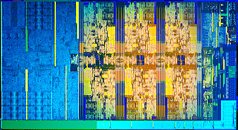Thursday, January 4th 2018

Intel Released "Coffee Lake" Knowing it Was Vulnerable to Spectre and Meltdown
By the time Intel launched its 8th generation Core "Coffee Lake" desktop processor family (September 25, 2017, with October 5 availability), the company was fully aware that the product it is releasing was vulnerable to the three vulnerabilities plaguing its processors today, the two more publicized of which, are "Spectre" and "Meltdown." Google Project Zero teams published their findings on three key vulnerabilities, Spectre (CVE-2017-5753 and CVE-2017-5715); and Meltdown (CVE-2017-5754) in mid-2017, shared with hardware manufacturers under embargo; well before Intel launched "Coffee Lake." Their findings were made public on January 3, 2018.
Intel's engineers would have had sufficient time to understand the severity of the vulnerability, as "Coffee Lake" is essentially the same micro-architecture as "Kaby Lake" and "Skylake." As one security researcher puts it, this could affect Intel's liability when 8th generation Core processor customers decide on a class-action lawsuit. As if that wasn't worse, "Skylake" and later micro-architectures could require micro-code updates in addition to OS kernel patches to work around the vulnerabilities. The three micro-architectures are expected to face a performance-hit, despite Intel extracting colorful statements from its main cloud-computing customers that performance isn't affected "in the real-world." The company was also well aware of Spectre and Meltdown before its CEO dumped $22 million in company stock and options (while investors and the SEC were unaware of the vulnerabilities).
Intel's engineers would have had sufficient time to understand the severity of the vulnerability, as "Coffee Lake" is essentially the same micro-architecture as "Kaby Lake" and "Skylake." As one security researcher puts it, this could affect Intel's liability when 8th generation Core processor customers decide on a class-action lawsuit. As if that wasn't worse, "Skylake" and later micro-architectures could require micro-code updates in addition to OS kernel patches to work around the vulnerabilities. The three micro-architectures are expected to face a performance-hit, despite Intel extracting colorful statements from its main cloud-computing customers that performance isn't affected "in the real-world." The company was also well aware of Spectre and Meltdown before its CEO dumped $22 million in company stock and options (while investors and the SEC were unaware of the vulnerabilities).

111 Comments on Intel Released "Coffee Lake" Knowing it Was Vulnerable to Spectre and Meltdown
usually it's ...
"oh it's Intel, no biggies, we can forgive them"
"what? AMD has a bug in their CPU? BURN DOWN THE WITCHE!"
actually considering financial disparities between these two ... i consider Intel blunder to be unforgivable :laugh:
This isn't true for meltdown as can be seen with AMD chips right now.
meltdownattack.com/
That website is one they created to publish the information for everyone to read. According to them and the documentation they have provided, your conclusions are incorrect.
By the way welcome to my ignore list.
In this case we have CPUs that don't perform exactly the same as before and after the news broke of it's security vulnerabilities and the patch and the potential risks on down the road. At least thus far.
The last 2 years for Intel have been nothing but shit from the thin PCB of skylake bending, to their shitty TIM, to IME issues, and now this (the biggest of them all). I know this list is missing allot but people get the point.In most cases, Companies are not required to admit fault, merely they are required to pay money. It's shitty but it's the way the system works. Companies are granted far more rights and power than individuals.Well, when you say it like that you make it sounds like one of the most horrible economic systems out there. Granted, we are definitely seeing how bad unmitigated capitalism can really be.
It's not Intel's motherboards, it's Intel's chipset granted, the rest is handled by AIB's, last time I checked Intel wasn't in charge of that. Furthermore would you get a 8700k and stick it on a $20 MB?.
Any company out there would've done the same thing in Intel's position and if the Data Centers can live with it I'm betting so can the average user who won't notice the difference. If Intel cocked-up which they did they will pay there's no way around that. Mind posting the links to those 30% less performance benches? Asking out of sheer curiosity.Skylake sold, Kaby sold, Coffee sold. If a product is inferior by any means in your opinion you have other options which now you do: Ryzen. The only one responsible for Intel's tight grip on the market is whom? If the answer is the lack of competition you are right and I'm not sure if Intel is worried about AMD at this point either since they still control the enterprise segment and they will as long as contracts are still running.
The rest is politics which I won't get into.
EDIT sorry for the late response, didn't see it earlier..